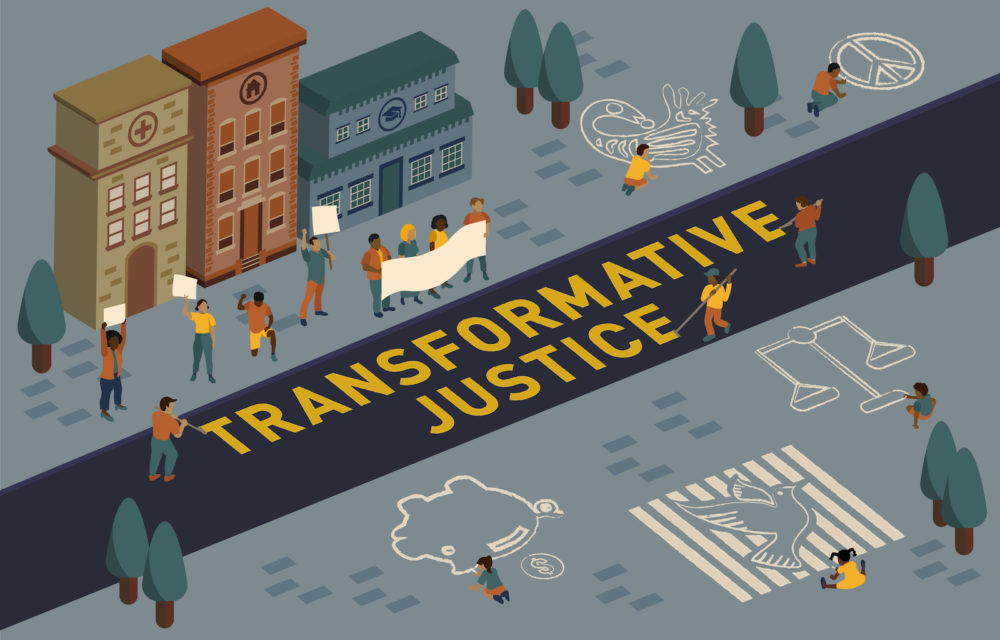
The 2020-21 Bellarmine Forum Building Transformative Justice Where We Stand is proud to present a compelling lineup of events this spring featuring thought leaders on restorative justice, a timely initiative that crosses disciplinary boundaries and calls us to consider alternative systems. All LMU students, faculty, staff, and community members are invited to participate.
The spring program begins on Thursday, Feb. 4, with “Elevating Community Voices: Restorative Justice Practices at LMU.” As part of the CSJ Center for Reconciliation and Justice’s annual symposium, this event will provide an understanding of the principles of restorative justice, their inherent connection to Ignatian values, as well as how we may apply them in educational settings.
A speaker series connected to Andrew Dilts’s political science course, POLS 4998: Special Studies in Transformative Justice will occur on Feb. 9, Feb. 23, March 12, March 23 and April 12. The guest lecturers participating in the series are leading thinkers in the liberal arts, such as Deva Woodly from the New School and Reuben Jonathan Miller from the University of Chicago, among others, who will engage students on a range of real-world issues that provide opportunities for social change and to solve problems more effectively. Such topics include critical reflections on the Stanford rape trial, mass incarceration, recidivism, trans politics, and the evolving role of social democracy movements like Black Lives Matter.
Beyond guest lectures, the Bellarmine Forum is hosting a valuable array of roundtables and panel discussions. The first, “Perspectives on Police Reform and Abolition from Northern Ireland and the United States,” will be a comparative exploration of policing in Northern Ireland and the United States and of those efforts by community activists to reform the police and policing practices. The nationalist/republican community in Northern Ireland and communities of color in the United States have a shared historical experience of the police not having the support of the community they were there to serve. Police reform was central to the peace negotiations in Northern Ireland and a key part of the Good Friday Agreement. In the US and specifically, Los Angeles, police in communities of color have been heavily armed, enact disproportionate numbers of arrests and focus on suppression, while the communities of color need support. Panelists will share insights on why fundamental reform of policing is essential and share visions of what a just system of public safety would look like.
On Wednesday, March 10, the LMU Career and Professional Development, in partnership with the Office of Student Conduct, will present a panel, “Change in Action: Careers in Restorative Justice,” helping students discover sustainable, professional avenues to pursue their passion for restorative and social justice.
Engagement with the LMU community will continue on March 15 with a forum on multi-generational organizing for Black liberation. Robert Singleton, retired LMU professor of economics, and his wife, Helen Singleton M.A. ’85, will join #BlackAtLMU leaders consisting of current LMU student activists, alumni, and faculty to share ideas and perspectives on how we can truly take action for racial justice right now. The Singletons have organized protests and been involved in racial justice for decades. They led the Los Angeles Freedom riders in 1961, and organized with the National Association for the Advancement of Colored People (NAACP) and the Congress of Racial Equality (CORE) to fight against racially restrictive housing laws on the city’s west side as well as for racially integrated barbershops in the Westwood area.
This year, problems of social and racial equity have come to the forefront and the appropriateness of state violence has been questioned and resisted with new vigor. These events offer a way for the LMU community to learn about and take part in the Bellarmine Forum’s shared mission: building new, transformative forms of justice from where we stand as a university community committed to social justice. Again, all are encouraged to join us.
We caught up with Professor Dilts, one of the co-hosts of this year’s forum, about what transformative justice is and why it is important. We are proud to share this conversation, in full, HERE.



